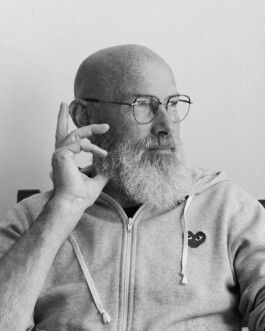CLICK ME
Menu
Swing your bat!


Every day I swing my imaginary baseball bat at conventional thinking. I challenge the most stubborn conventional parts of people's excuses.
In the autumn of 2013, Samsø Energiakademi led by Søren Hermansen invited me to attend an international symposium on the global environmental crisis. I was asked to speak on why people avoid acting on pending catastrophes. Why don't we take immediate and radical action? Back then, I understood it in the same way I do now: when people face insurmountable challenges, we have a hard time accepting that we can't solve them. So we reach for the second best option: excuses.
The example I used at the symposium illustrates this point nicely: few people rationally accept that we are facing a huge environmental problem and that we need solutions. Instead, we tell each other why we can't change our principles and practices. Most of us want to talk about solving environmental issues, but we become paralyzed because we can't see our way through. The outcome is that we postpone the necessary change because we insist on explaining the unexplainable. We all do it every day. Desperate, we cling to conventional explanations and use them to ignore problems we can't handle.
Things people say:
"Female managers overplay their roles by acting too tough."
"Nobody hires 50 year olds anymore."
"Creatives are terrible with finances."
With conventional thoughts like these, we miss out on great opportunities to creatively change our situation. Faced by something like this, you can safely turn your back on conventional thoughts and instead tell your female boss, "when you recognize, support, and inspire me, I am happier and much better at my job".
You can spend ten minutes on LinkedIn and learn that more than a handful of people in their fifties have posted about their new jobs, and you can ask them what they prioritized in their applications to get hired.
Or think of Casper Christensen, a creative who seems to be doing pretty well financially, and read up on his ownership of his production company and be inspired by his story.
This type of problem-facing creativity is a significant driver of innovation. A survey by OECD titled "Creative Thinking Framework" confirms my understanding. It builds on three observations:
1
Creative inventions and developments have driven human societies across the globe, in areas as diverse as science, technology, philosophy, art, and humanities.
2
It is widely understood that creative thinking drives the kind of innovation that has societal implications, but it is also a more universal and democratic phenomenon than we had hitherto imagined.
3
The development of creative thinking internationally may encourage positive change in the fields of educational policy and pedagogy.
My intention is to encourage all of you to start swinging your imaginary baseball bats at the fear-based conventional approach that makes you find excuses in difficult situations, just because you think you can't deal with them. Instead, I say this: seek the courageous, creative approach when facing tough problems.
The last time I swung my bat, the lucky recipient was a New York lawyer. She's behind some very prominent and successful commercial deals for her clients and has a desire to expand her activities into entrepreneurship. We had discussed it for a while, and I sensed her insecurity as to whether she was professionally qualified. Her conventional argument was that every lawyer who succeeded as an entrepreneur had attended business school. I saw her argument as an excuse to not follow her initiative, but to remain in her comfort zone. I told her so, and named five lawyers without business degrees who have succeeded with similar ventures. I also suggested that her concerns wouldn't go away by getting another education. She accepted my premise and is now free to talk about her initial worry, which was how to take the first step, and whom she wanted to get help from.
Let's get started!
Swing
your bat!

Every day I swing my imaginary baseball bat at conventional thinking. I challenge the most stubborn conventional parts of people's excuses.
In the autumn of 2013, Samsø Energiakademi led by Søren Hermansen invited me to attend an international symposium on the global environmental crisis. I was asked to speak on why people avoid acting on pending catastrophes. Why don't we take immediate and radical action? Back then, I understood it in the same way I do now: when people face insurmountable challenges, we have a hard time accepting that we can't solve them. So we reach for the second best option: excuses.
The example I used at the symposium illustrates this point nicely: few people rationally accept that we are facing a huge environmental problem and that we need solutions. Instead, we tell each other why we can't change our principles and practices. Most of us want to talk about solving environmental issues, but we become paralyzed because we can't see our way through. The outcome is that we postpone the necessary change because we insist on explaining the unexplainable. We all do it every day. Desperate, we cling to conventional explanations and use them to ignore problems we can't handle.
Things people say:
"Female managers overplay their roles by acting too tough."
"Nobody hires 50 year olds anymore."
"Creatives are terrible with finances."
With conventional thoughts like these, we miss out on great opportunities to creatively change our situation. Faced by something like this, you can safely turn your back on conventional thoughts and instead tell your female boss, "when you recognize, support, and inspire me, I am happier and much better at my job".
You can spend ten minutes on LinkedIn and learn that more than a handful of people in their fifties have posted about their new jobs, and you can ask them what they prioritized in their applications to get hired.
Or think of Casper Christensen, a creative who seems to be doing pretty well financially, and read up on his ownership of his production company and be inspired by his story.
This type of problem-facing creativity is a significant driver of innovation. A survey by OECD titled "Creative Thinking Framework" confirms my understanding. It builds on three observations:
1
Creative inventions and developments have driven human societies across the globe, in areas as diverse as science, technology, philosophy, art, and humanities.
2
It is widely understood that creative thinking drives the kind of innovation that has societal implications, but it is also a more universal and democratic phenomenon than we had hitherto imagined.
3
The development of creative thinking internationally may encourage positive change in the fields of educational policy and pedagogy.
My intention is to encourage all of you to start swinging your imaginary baseball bats at the fear-based conventional approach that makes you find excuses in difficult situations, just because you think you can't deal with them. Instead, I say this: seek the courageous, creative approach when facing tough problems.
The last time I swung my bat, the lucky recipient was a New York lawyer. She's behind some very prominent and successful commercial deals for her clients and has a desire to expand her activities into entrepreneurship. We had discussed it for a while, and I sensed her insecurity as to whether she was professionally qualified. Her conventional argument was that every lawyer who succeeded as an entrepreneur had attended business school. I saw her argument as an excuse to not follow her initiative, but to remain in her comfort zone. I told her so, and named five lawyers without business degrees who have succeeded with similar ventures. I also suggested that her concerns wouldn't go away by getting another education. She accepted my premise and is now free to talk about her initial worry, which was how to take the first step, and whom she wanted to get help from.
Let's get started!
Blegdamsvej 6, 1st floor
Copenhagen, Denmark
Telephone +45 3232 3232
journal@weareheadlight.com
© 2020 Headlight Journal. All rights reserved.
Blegdamsvej 6, 1st floor
Copenhagen, Denmark
Telephone +45 3232 3232
journal@weareheadlight.com
© 2020 Headlight Journal. All rights reserved.